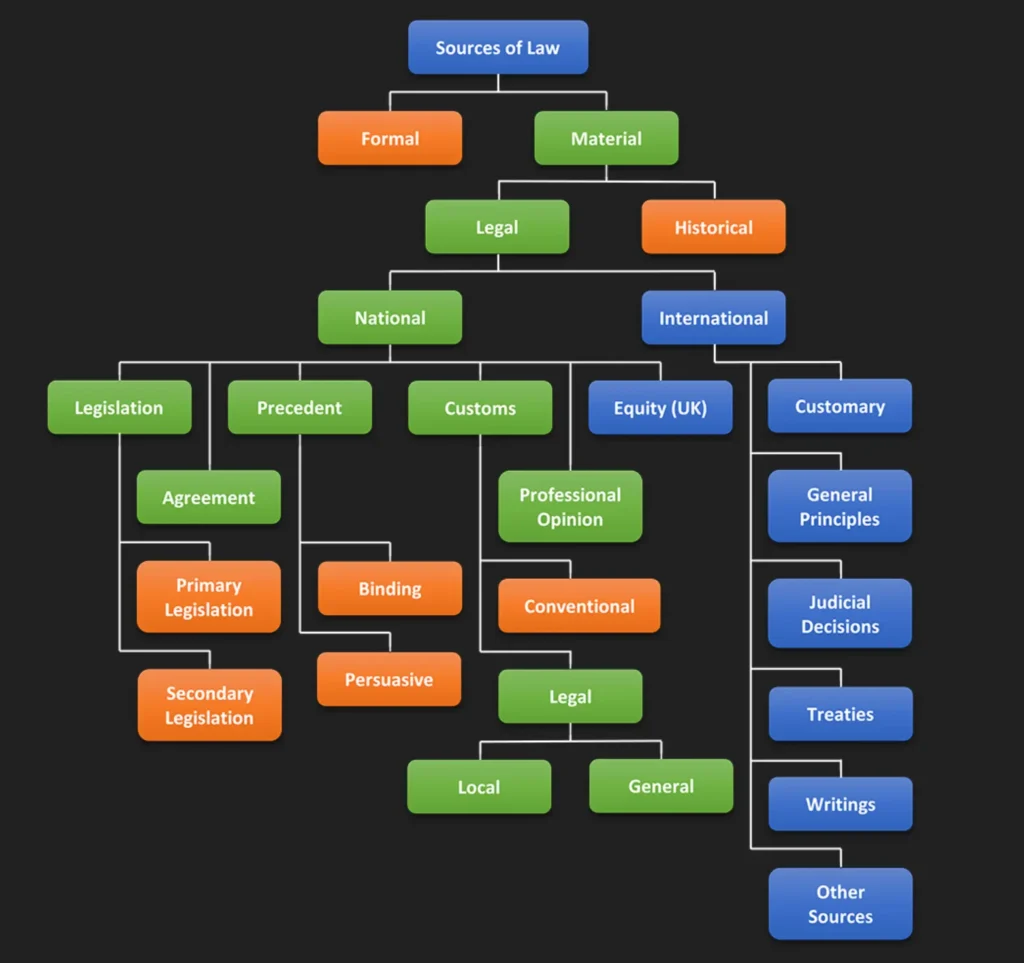Introduction
Law is the foundation upon which the sovereignty of a state rests. It is the supreme authority of a state over its people and territories, implemented through the machinery of the government. Every law represents the formulated will of the state, backed by its sovereign power, and any violation is subject to punishment. Through its laws, the state performs its various functions and maintains order in society.
Meaning and Definition of Law
The term “Law” comes from the Teutonic word “Lag,” meaning “definite.” Law defines a definite rule of conduct and human relations, applying uniformly to all individuals within a state. It regulates the general conditions of human activity, with the sovereign power of the state enforcing it.
Definitions by Legal Scholars
Austin: “Law is the command of the sovereign. It is the command of the superior to an inferior, and force is the sanction behind Law.”
Holland: “A Law is a general rule of external behaviour enforced by a sovereign political authority.”
In simple terms, the law is a binding rule of behaviour, made and enforced by the government, and its violation is punished by the state.
Also Read: Realist School Of Jurisprudence
Features of Law
General Rule of Behavior
Law is a general rule of human conduct, applicable to all individuals within the state, including aliens.
Definite and Formulated Will
Law is precise and represents the will of the state, formulated and implemented by the government.
Sovereign Power
The sovereignty of the state underpins the binding nature of law.
Coercive Power
Law is backed by the coercive power of the state, and violations are always punished.
Peace and Security
The primary purpose of law is to provide peace, protection, and security to the people, ensuring their all-round development.
Equality
Modern legal systems uphold the rule of law, equality before the law, and equal protection of the law without discrimination.
Dispute Resolution
Courts settle disputes based on the law, providing a mechanism for conflict resolution.
Sources of Law

The development and evolution of law are influenced by various sources:
1. Custom
Custom is one of the oldest sources of law, arising from the habitual practices and traditions of society. Over time, the state began to formalize these customs into binding rules, transforming them into laws.
2. Religion and Morality
Religion and morality have historically provided a foundation for law. Religious codes and moral standards have influenced the formulation of laws, integrating principles of right and wrong into legal systems.
3. Legislation
Legislation is the process of law-making by the legislature, which has become the chief source of law in contemporary times. It involves the creation of definite and enacted rules of behaviour, transforming the will of the state into binding laws.
4. Delegated Legislation
Due to practical constraints, legislatures delegate some law-making powers to the executive. This delegated legislation allows the executive to make rules within the framework provided by the legislature, addressing specific needs and situations.
5. Judicial Decisions
Judicial decisions, especially those of higher courts like the Supreme Court and High Courts, serve as important sources of law. These decisions interpret and apply laws to specific cases, creating precedents that guide future cases.
6. Equity
Equity represents fairness and justice in the application of laws. Judges use principles of equity to fill gaps and address issues not covered by existing laws, ensuring just outcomes in legal proceedings.
7. Scientific Commentaries
The works of eminent jurists and scholars provide scientific commentaries on the Constitution and laws. These commentaries help courts interpret laws and guide the development of legal principles.
Types of Law
The law can be broadly categorized into two main types:
1. National Law
National law governs the conduct of individuals within a state and is backed by the coercive power of the state. It includes:
- Constitutional Law: The supreme law of the land, outlining the organization, powers, and functions of government, as well as the rights and duties of citizens.
- Ordinary Law: Also known as statute law or municipal law, it regulates the conduct of individuals and their relations with each other and the state.
2. International Law
International law governs the conduct of states in their interactions with each other. It is based on mutual consent and agreements, guiding behaviour in international relations without a centralized enforcing authority.
Subtypes of National Law
Private Law: Regulates relationships among individuals, ensuring the protection of personal rights.
Public Law: Governs the relationship between individuals and the state, including:
- General Public Law: Applies to all citizens in their relations with the state.
- Administrative Law: Governs the exercise of authority by government agencies and their interactions with the public.
Conclusion
In summary, law is a complex and multifaceted system that provides the framework for social order, justice, and development. Its sources and types reflect the diverse ways in which societies regulate behaviour and resolve conflicts, ensuring peace and stability.
FAQs
1. What is the definition of law?
Law is a definite rule of conduct and human relations, applicable uniformly to all individuals within a state. It regulates the general conditions of human activity and is enforced by the sovereign power of the state.
2. What are the main sources of law?
The main sources of law include custom, religion and morality, legislation, delegated legislation, judicial decisions, equity, and scientific commentaries.
3. What are the different types of law?
The two main types of law are national law, which governs the actions of individuals within a state, and international law, which guides the behaviour of states in international relations. National law is further classified into constitutional law and ordinary law, which includes private law and public law.
Also Read: Sociological School Of Jurisprudence
Reference: sciencedirect.com